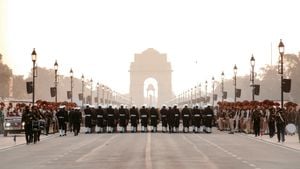Pope Francis remains critically ill as he continues his hospital stay for severe respiratory complications. According to the Vatican, the 88-year-old pontiff has been receiving treatment for pneumonia and associated health issues for over a week. The most recent updates indicate he experienced significant respiratory distress and has required high-flow oxygen support, highlighting the seriousness of his condition.
Hospitalized since February 14 primarily for bronchitis, Pope Francis's health took a turn for the worse, with doctors later diagnosing him with pneumonia affecting both lungs. The Vatican has conveyed the seriousness of the situation, stating, "The Holy Father remains in a state of crisis, and he is not out of danger." This marks the first time the Vatican explicitly used the term "critical" to describe the Pope's health status, indicating increased concern for his well-being.
Recent communications from the Vatican reveal troubling developments; blood tests have shown thrombocytopenia linked to anemia, necessitating blood transfusions. While the Pope has managed to stay awake and alert throughout his illness, he reportedly felt more discomfort as days progressed. Dr. Sergio Alfieri, leading the medical team caring for the Pope at Gemelli Hospital, underscored the potential risk of septicemia stemming from his pneumonia, stressing the importance of closely monitoring his condition.
"The real danger is if germs enter the bloodstream, which could lead to septic shock. Given his respiratory problems and age, treating septicemia would be quite challenging," Dr. Alfieri explained. He indicated the Pope is conscious of the gravity of his condition, stating, "He knows his life is at stake and has asked us to say so." This sentiment signals the deep worry surrounding the Pope’s health, especially as rumors circulate about his capacity to fulfill his papal duties.
Adding to the circumstances, several public ceremonies have continued without the Pope's presence as the Vatican celebrates the Year of Grace. The pall of uncertainty about his health has led to speculation about possible resignation, echoing the earlier example of Pope Benedict XVI, who stepped down. An expert on religious matters, Alain Pronkin, asserts, "He is not out of the woods—not out of danger, but he’s not at death’s door either." Nevertheless, with the Pope's age and chronic lung disease, the prospect of continuing his papacy without encountering significant health setbacks remains precarious.
The Vatican has firmly rejected rumors of imminent resignation, asserting the Pope is still able to function mentally and work. Cardinal Pietro Parolin, the Vatican's Secretary of State, called these speculations "useless," reflecting the institution's desire to quell needless anxiety among the faithful and public.
Nonetheless, the Pope's absence from public duties for two weeks has prompted considerable concern among followers. Many have gathered outside the hospital, praying for his recovery, signaling strong emotional and devotional support from around the globe.
Given his current status, experts maintain it’s imperative to monitor his medical treatment as many aspects of his health remain unstable. The conditions for the Pope’s transition or even resignation seem uncertain, as no explicit provisions exist within canon law to address such scenarios.
With many around the world holding the Pope and his health prayers, stress continues to mount on whether he can resume his responsibilities. Clearly, following this latest update, the situation remains dire, and vigilance will be required during the Pope's significant recovery and treatment process.



